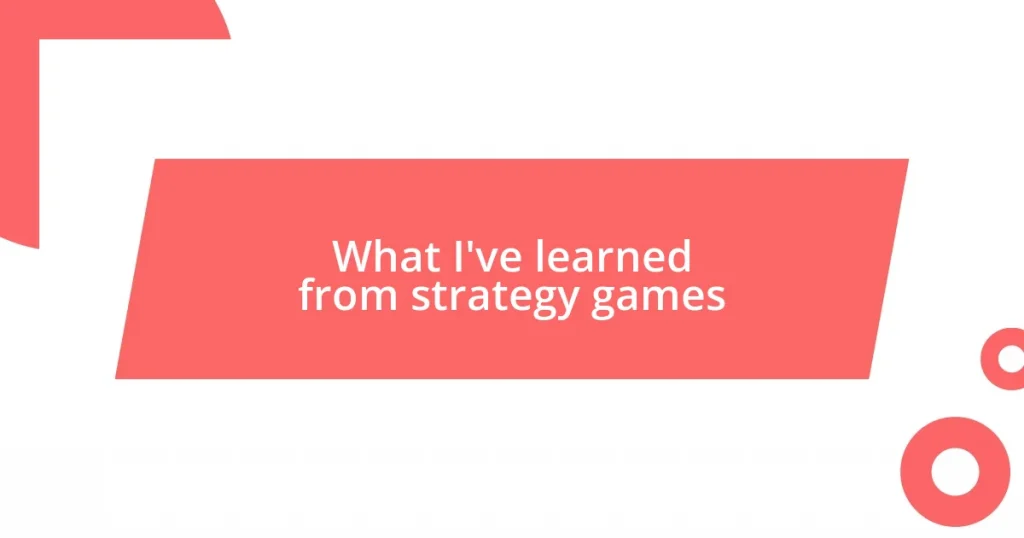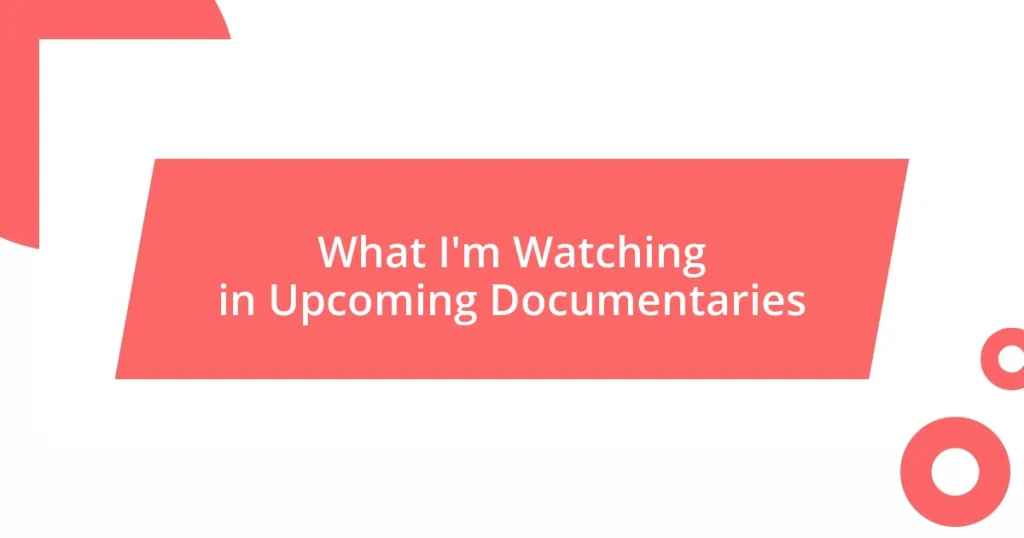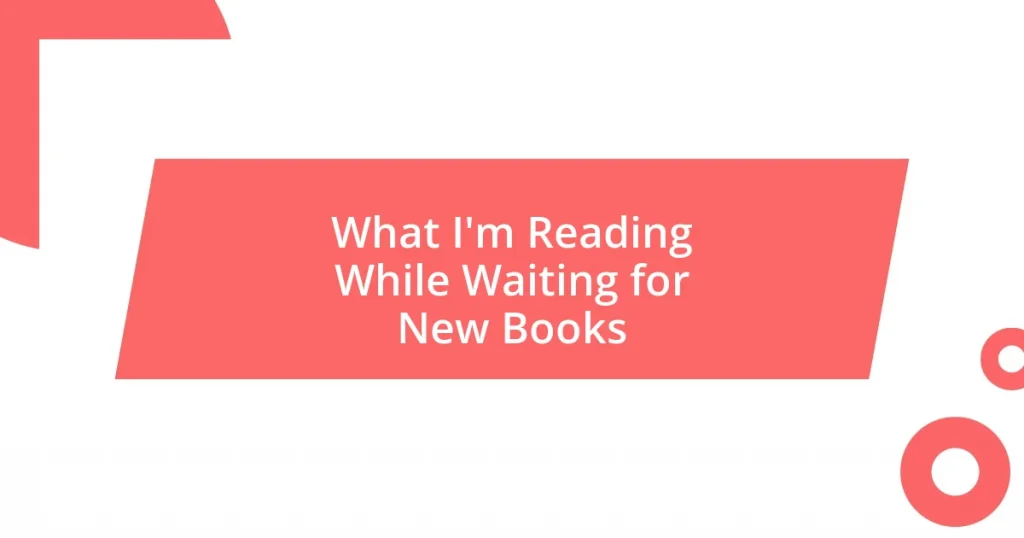Key takeaways:
- Strategy games enhance critical thinking, adaptability, and teamwork, teaching players valuable skills applicable in real-life situations.
- Analyzing resources and limitations within games mirrors real-life constraints and fosters creativity and strategic planning.
- Embracing failure and prioritizing tasks are essential lessons from gaming experiences that contribute to personal growth and effective decision-making.
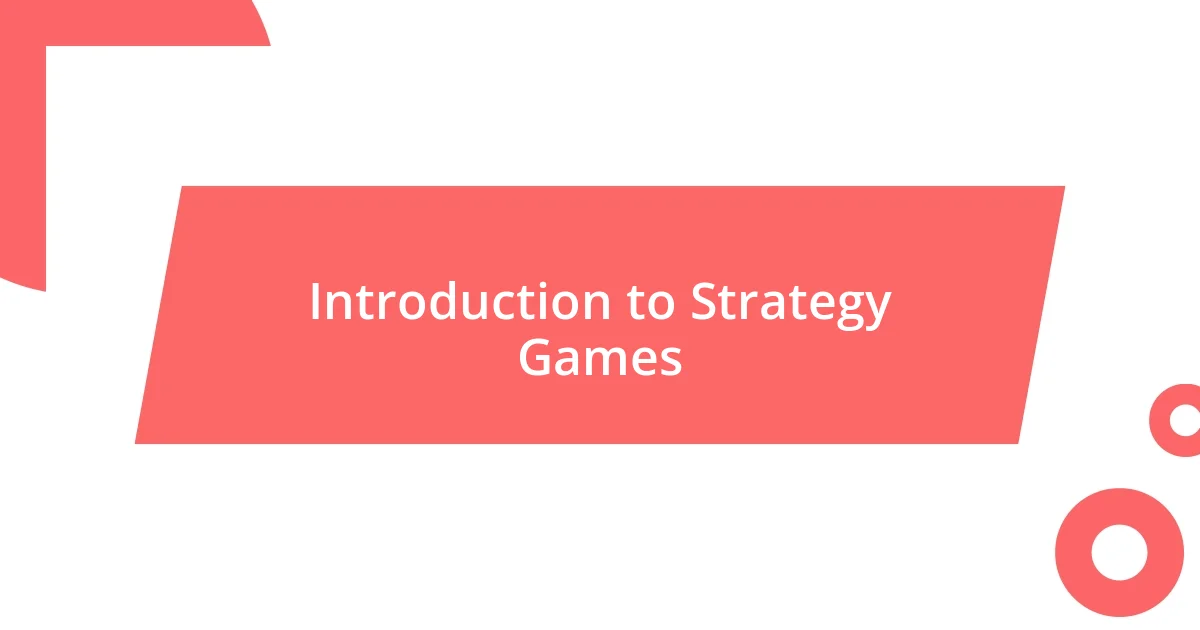
Introduction to Strategy Games
Strategy games have always fascinated me, sparking a love for problem-solving and critical thinking. Whether it’s leading armies to victory in a war simulation or meticulously planning a city’s growth in a resource management game, each scenario offers a unique challenge that pushes the player to think several steps ahead. Have you ever found yourself so engrossed in a game that the hours just flew by?
I recall one particular evening spent hunched over a strategy game, trying to outmaneuver my opponent. Every move I made felt like I was playing a complex game of chess, not just with pieces but with lives and futures in a virtual world. The excitement of anticipating my opponent’s next step was absolutely exhilarating—and it taught me that every decision I made had real consequences.
In exploring this genre, I’ve realized that strategy games aren’t just mindless fun; they strengthen our analytical skills and encourage us to embrace patience. The thrill of overcoming a tough challenge or outsmarting a rival can evoke emotions similar to those experienced in real-life situations, making the lessons learned all the more impactful. What personal insights have you gained from a game that really stood out to you?
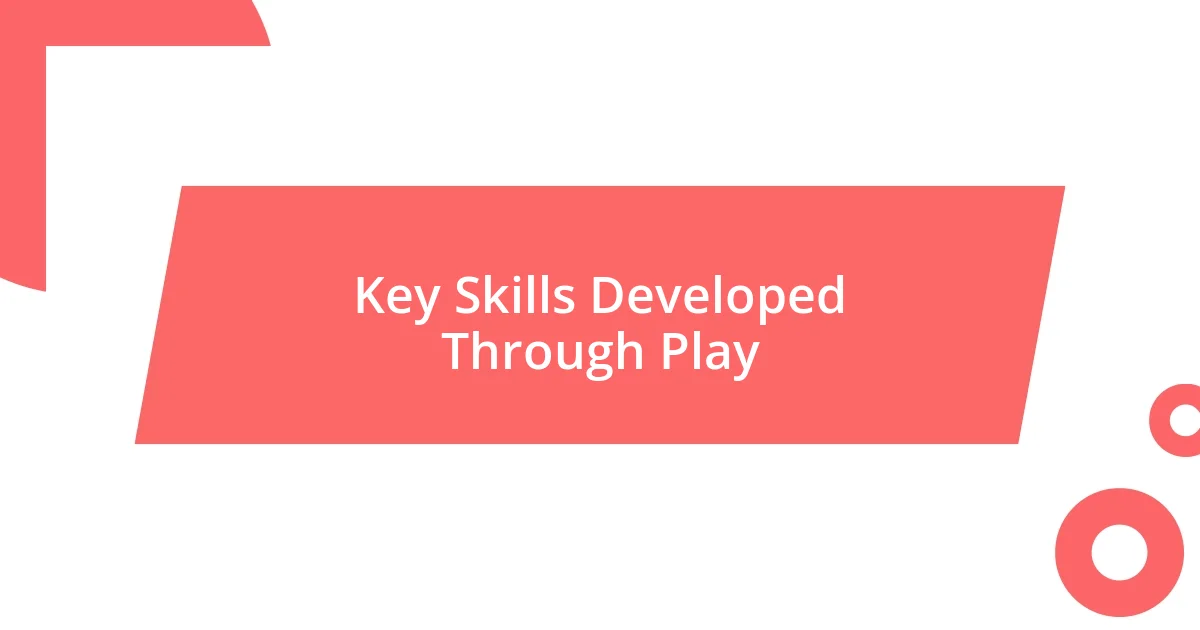
Key Skills Developed Through Play
When I dive into a strategy game, I’m often surprised by how quickly I pick up valuable skills. These games sharpen my ability to think critically and evaluate multiple factors before making a decision. Just last month, I found myself in a resource management game where mismanaging my budget led to a spectacular failure, driving home the importance of strategic planning and foresight.
Some key skills developed through such play include:
- Critical Thinking: Evaluating situations and making informed decisions.
- Patience: Learning to wait for the right moment to strike or act.
- Adaptability: Adjusting strategies in response to changing circumstances.
- Resource Management: Allocating limited resources wisely to achieve goals.
- Teamwork: Collaborating with others to achieve a common objective, especially in multiplayer settings.
Reflecting on my experiences, it’s clear how much these skills translate into everyday life, making me a more strategic thinker both in games and in personal decisions. I remember one moment where I had to negotiate a tricky alliance with a rival player; it taught me the art of compromise while staying true to my goals.
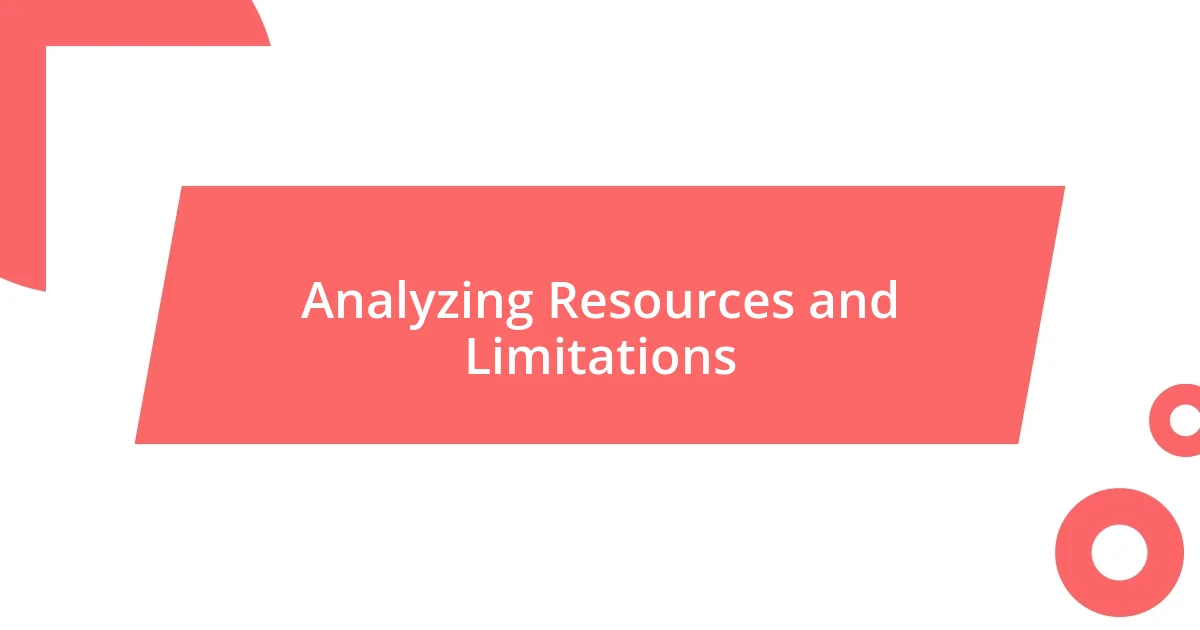
Analyzing Resources and Limitations
Analyzing resources and limitations in strategy games is akin to real life where we often face constraints. I remember playing a city-building game where I had to balance the expansion of infrastructure without exhausting my resources. Every decision led me to reflect on the trade-offs. Did I need more houses, or should I invest in defense? These experiences taught me that being aware of what I have—and what I lack—can profoundly shape my strategy and outcomes.
In many games, resources are finite, and I’ve often found myself on the brink of running low on a critical element. There was one instance in a survival strategy game where my failure to gather enough food led to a swift downfall. It was a stark reminder that limitations can be obstacles, but they can also inspire creativity. How can I pivot my strategy with what I have left? This is where resourcefulness comes into play, pushing me to think outside the box and make the most of my surroundings.
I’ve also noticed the psychological aspect of managing resources. The pressure of not having enough gold or troops can create a sense of urgency, which in turn heightens my focus and decision-making power. I recall a tense moment where I faced an enemy stronger than my forces, forcing me to employ guerilla tactics to outsmart them. It was an exhilarating experience that highlighted not just the importance of my available resources, but the strategic limitations that pushed me to forge a path to victory despite the odds.
| Resource Type | Limitation Impact |
|---|---|
| Gold | Essential for upgrades and creating units; Limited availability requires prioritization. |
| Food | Contributes to population growth; Insufficient supplies can stall progress. |
| Time | Certain actions take time; Delays can provide opportunities for the opponent. |
| Military Units | Key to defense; Overextension may lead to vulnerabilities. |
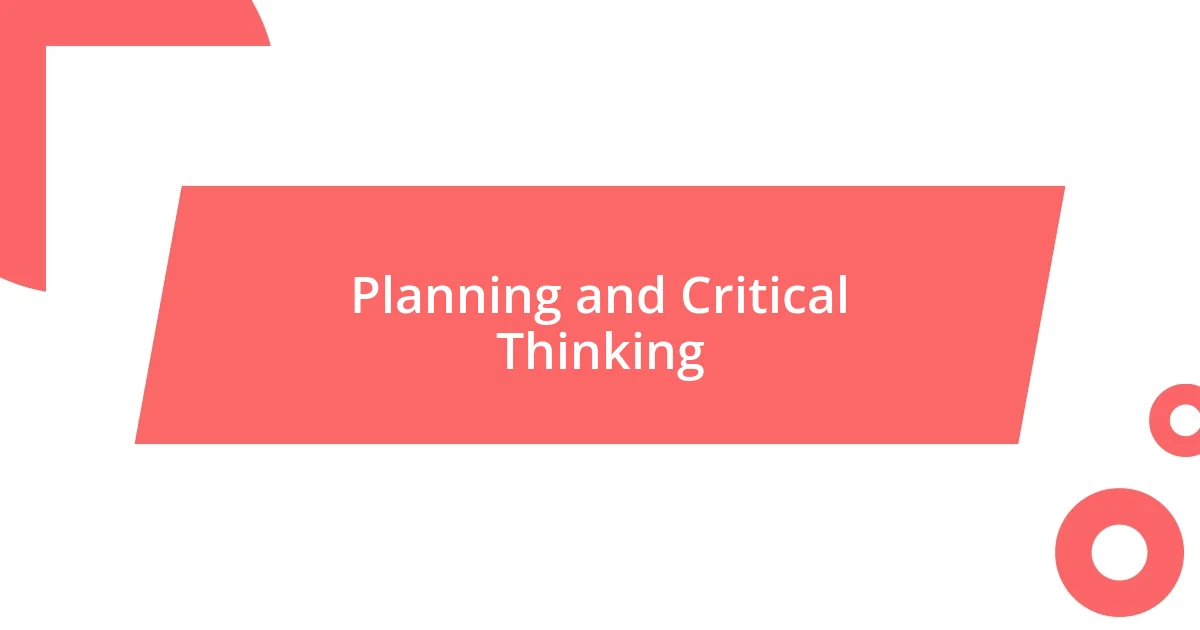
Planning and Critical Thinking
Planning in strategy games often forces me to think several moves ahead. I recall a time when I found myself in a fierce chess match where every piece I moved felt like a mini-calculation of consequences. It’s not just about what you do now, but how each decision impacts your future options. In that moment, I grasped the essence of forethought: the ability to visualize outcomes before they happen is something I’ve carried beyond the game board.
Critical thinking plays an integral role in this process, reshaping my approach to problem-solving. While playing a turn-based strategy game, I faced a choice between two drastically different paths: a direct assault or a more defensive position. The pressure to weigh immediate gains against long-term strategy was palpable. I felt my heart race as I analyzed potential scenarios—what if my opponent expected me to go on the offensive? It taught me the importance of analyzing not just my own objectives, but also considering the opponent’s mindset.
Sometimes, I wonder how much I truly know about strategic planning until I’m deep in the chaos of a live match. There’s a rush that comes from making pivotal decisions under pressure. During a fast-paced multiplayer skirmish, I experienced a moment where I improvised my strategy mid-game, adapting to unexpected enemy moves. It was exhilarating—it felt like I was crafting a narrative with every decision. Reflecting on that, I realized that learning to plan and think critically not only enhances gameplay but also enriches how I navigate challenges in everyday life. Isn’t it fascinating how a game’s pressure can mirror real-world problem-solving?

Adapting to Changing Environments
Adapting to changing environments is a critical skill I’ve honed through my experiences with strategy games. In a real-time strategy game, I vividly remember an instance when my enemy unexpectedly altered their tactics. Suddenly, I found myself with a choice: stick to my original plan or pivot swiftly to counter their moves. I chose to quickly adapt, changing my resource allocation while redirecting my troops to the new threat. This taught me that flexibility can often be the difference between a win and a loss. Have you ever felt that pressure to shift gears suddenly? It’s both exhilarating and nerve-wracking.
In another game, the map I was familiar with altered due to an in-game event. I had relied on certain chokepoints to defend my territory, but now those strategies were rendered obsolete. I recall my frustration, but also a thrill as I brainstormed new tactics on the fly. It was a reminder that comfort zones can quickly shift, and embracing change often unlocks creative solutions that I hadn’t considered before. How do you react when faced with unexpected changes? I’ve found that my most substantial growth comes from those “what now?” moments.
Ultimately, the ability to adapt fosters resilience. In a challenging game, I once faced an opponent whose strategy outclassed mine. Instead of conceding, I altered my approach and focused on guerrilla tactics, working within the constraints of the new battlefield. It felt empowering to turn the tables—not through sheer strength but by being agile and resourceful. That’s a lesson I carry with me: in life, as in games, adapting to shifting environments is essential for progress. How often do we let our adaptability shine in the face of challenges? For me, it’s a revelation worth embracing.
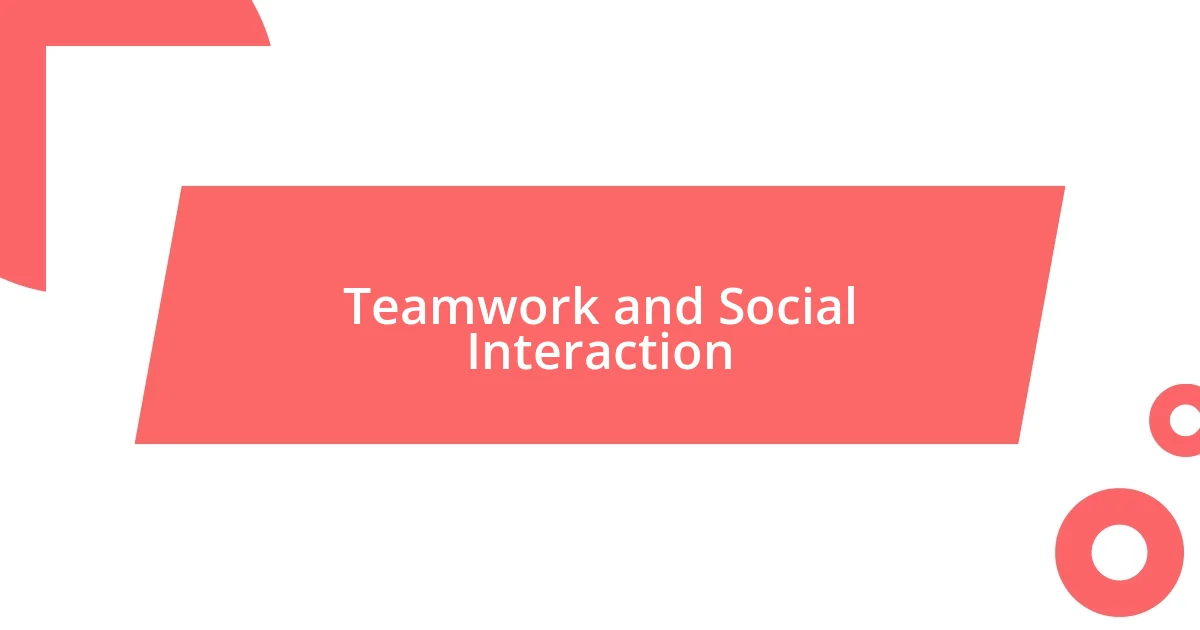
Teamwork and Social Interaction
Teamwork in strategy games has shown me the power of collaboration and communication. Once, while playing a cooperative board game, my team and I faced a major obstacle that seemed insurmountable. We huddled together, sharing ideas and devising a plan, and suddenly, the pieces started to fall into place. It was a fantastic moment that cemented my belief: working together can turn the tide in any situation. Have you ever experienced that rush of synergy with teammates? It’s a feeling that’s hard to forget.
Social interaction is equally crucial, shaping how we engage with one another in both games and life. In a particularly intense multiplayer match, I found myself navigating not just my strategy but also the personalities of my fellow players. I remember a heated debate over our tactics, where everyone was passionate about their viewpoints. It felt chaotic at times, but it ultimately led to a breakthrough strategy that we may never have considered alone. How often do we allow differing opinions to spark creativity? In that moment, I recognized that varied perspectives could be a source of strength.
Moreover, the friendships forged through these games often transcend the virtual realm. Reflecting on game nights with friends, I cherish the laughter and camaraderie that develops around the table or screen. Those shared experiences reinforce connections that go beyond just strategies and scores; they become stories we reminisce about. Isn’t it lovely how a game can bring people together? Ultimately, I’ve found that the bonds formed in the heat of competition often become some of the richest relationships in my life.
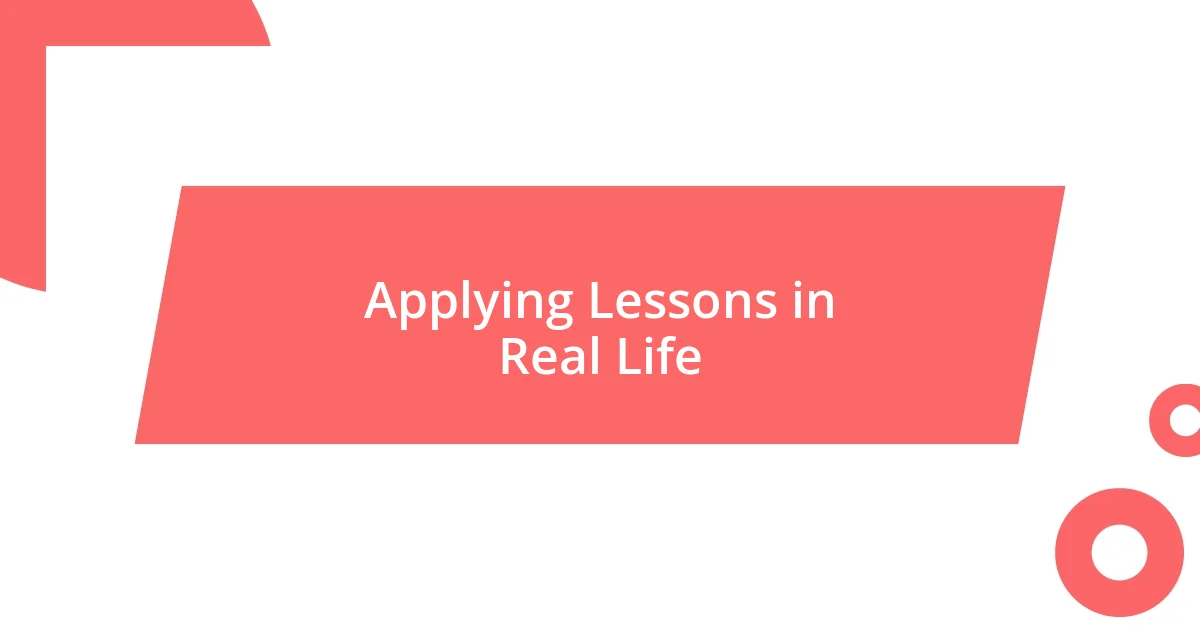
Applying Lessons in Real Life
There are times in life when the strategies I’ve learned in games come rushing back, especially during decision-making moments. I recall a day at work when a project veered completely off course due to an unexpected budget cut. In that moment, I remembered a similar situation from a strategy game where I had to choose between salvaging lost units or reallocating resources to strengthen my position. Here, I opted for flexibility, communicating with my team to brainstorm alternative solutions. How do we manage when faced with sudden constraints? Finding creative paths forward proved not only effective but also strengthened my team’s collaboration.
Another lesson I appreciate is the art of prioritization. I often reflect on a game night where I became overwhelmed by numerous objectives. My friend reminded me to focus on our game’s primary goal instead of spreading ourselves too thin. I took that guidance to heart and I’ve since applied the same principle in my daily life. Have you ever felt torn by competing priorities? I now approach tasks with a sharper focus, learning that tackling one challenge at a time often leads to greater success.
Learning to embrace failure has also resonated deeply with me. I vividly recall a particularly brutal loss in a strategic board game last year; I made a risky move that backfired spectacularly. I remember the feeling of disappointment, but then I sat with it. Instead of dwelling, I analyzed what went wrong and adjusted my approach. This experience taught me that it’s not about the loss but rather how I bounce back from it. Don’t you think resilience is one of the most critical skills we can develop? Embracing mistakes has transformed my view on challenges; now, they are opportunities for growth rather than setbacks.










